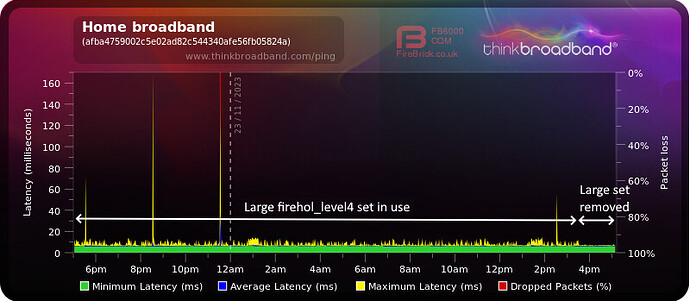Not trying to necro the thread here but I'm wondering if anyone ever found any resolution for this? I am running banIP on an ipq807x (Xiaomi AX3600) and see the exact same problem with IPSets and NFTables. Loading or reloading a large IPSet takes many minutes (like 20-30) while pegging the CPU the entire time. I had to adjust settings to break the IPSet into 1024 element chunks or the router will easily go OOM. I've been writing this post on an off and while I'm writing this it has been 21 minutes and the IPSets are still reloading as we speak. Surely this behavior can't be normal? Even if the aggregate set has 300K IPs in it (not actually sure how many just now) it shouldn't be consuming 100s of MB to do this, no? It seems like there has to be some kind of memory allocation bug here.
Also, after about 7 days uptime I have noticed that the router will simply stop passing traffic to certain internal IPs. No idea why. Seem to be IoT type devices for the most part that are always dropping and reconnecting. I have seen it also on a phone or a laptop if I'm screwing around with the WiFi and the devices keep reconnecting. Not sure if its related at all but a reboot seems to fix it.
Edit to add:
Active Feeds
allowlistv4MAC, allowlistv6MAC, allowlistv4, allowlistv6, bogonv4, cinsscorev4, countryv4, deblv4, feodov4, dshieldv4, etcompromisedv4, greensnowv4, proxyv4, iblockspyv4, ipthreatv4, sslblv4, threatv4, threatviewv4, talosv4, torv4, urlvirv4, urlhausv4, turrisv4, voipv4, yoyov4, webclientv4, blocklistv4MAC, blocklistv6MAC, blocklistv4, blocklistv6
Last Run
action: reload, log: logread, fetch: uclient-fetch, duration: 21m 6s, date: 2024-05-03 15:46:59
System Information
cores: 4, memory: 80, device: Xiaomi AX3600, OpenWrt 23.05.3 r23809-234f1a2efa
